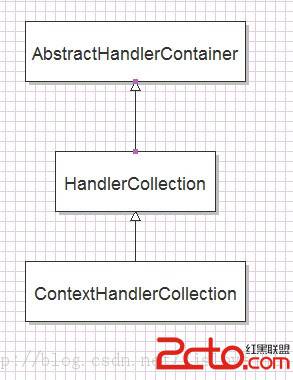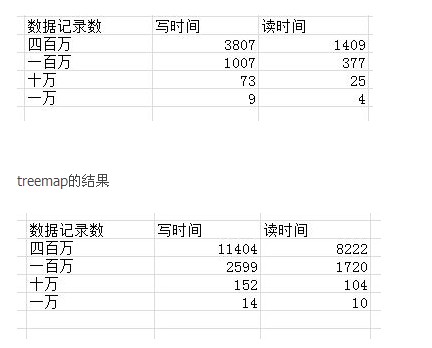jetty的servlet请求路由与ContextHandlerColleection的实现
我们一般会在tomcat下面部署多个应用,每个应用都对应着一个自己的context,那么就需要一个collection将他们管理起来,而且需要对http请求进行路由,将http请求交个相应的应用来处理。。。。这件事情在jetty中就是ContextHanlerCollection干的事情,它维护者当前jetty中部署的应用。。。将http请求交给匹配的context,然后context再转由内部的servlet来处理。。。。
好了。。还是先来看看ContextHanlerCollection的继承体系吧:

本身继承还是很简单的,前面已经说过了,整个jetty在这方面都还算比较简单一些。。。
其实从名字就能够知道这是一个collection,用于存储handler,其实这里的handler就是前面的文章分析过的contextHandler。。。。
这里我们先来看看HandlerCollection的定义吧。。。这里我们就来看看一些比较重要的内容就好了。。。。
[java]
//添加一个handler,其实是要将其添加到最后面去,说白了就是建立一个数组
public void addHandler(Handler handler) {
setHandlers((Handler[])LazyList.addToArray(getHandlers(), handler, Handler.class));
}
这个是添加handler的方法,其实也就是建立一个数组,新添加的handler将会在这个数组的最后面。。。
[java]
//其实就是启动保存的所有的handler
protected void doStart() throws Exception {
MultiException mex=new MultiException();
if (_handlers!=null)
{
for (int i=0;i<_handlers.length;i++)
try{_handlers[i].start();}catch(Throwable e){mex.add(e);}
}
super.doStart();
mex.ifExceptionThrow();
}
启动,其实也没啥意思,主要就是启动当前所包含的所有的handler
另外handlerCollection本身也有handle方法,不过这个方法的实现比较的扯淡,对于http请求,它会遍历所有的handler,然后直到找到一个handler将这个http请求处理了为止。。。它的实现将会在ContextHandlerCollection中被覆盖。。。
好了,接下来我们来看看ContextHandlerCollection的定义吧,先来看两个比较重要的属性的定义:
[java]
private PathMap _contextMap; //用于context的map,将contextPath与contextHandler对应起来,而且还有lazy匹配,一些前缀,后缀匹配什么的
private Class _contextClass = ContextHandler.class; //这里是用到的handler的类型
首先前面的contextMap就是用于维护contextPath与contextHandler的对应关系,PathMap是jetty自己定义的类型,它继承自HashMap,但是对其进行了一些扩展,加上了前缀匹配,后缀匹配。。。lazy匹配什么的。。。
至于PathMap的分析留给以后吧,,,其实还算是比较有意思的东西,毕竟所有的http请求都要先到这里经由它来匹配出相应的contextHandler,还算是比较重的。。。。而且在contextHandler中又要用到它来处理path与servlet的对应关系。。。
我们来看看它的doStart方法吧:
[java]
//启动当前的组件
protected void doStart() throws Exception {
mapContexts(); //对当前所有的app的context进行map
super.doStart(); //父类的启动组要是启动当前所有的handler
}
这里第一个方法的执行是比较重要的,它用于创建pathMap,创建当前所有的handler与path之间的对应关系。。。然后在执行父类的doStart方法,前面已经说过,在父类中主要是进行handler的启动工作。。。
好饿了。。那么我们来看看这个重要的mapContexts方法吧:
[java]
//用于map请求的path,这里会创建PathMap,用于path来索引相应的contextHandler
public void mapContexts() {
PathMap contextMap = new PathMap(); //创建一个pathmap
Handler[] branches = getHandlers(); //获取所有的handler
//遍历当前的所有的handler
for (int b=0;branches!=null && b<branches.length;b++) {
Handler[] handlers=null;
if (branches[b] instanceof ContextHandler) { //如果是contextHandler需要新创建爱你一个数组 。。?为啥。。?
handlers = new Handler[]{ branches[b] };
} else if (branches[b] instanceof HandlerContainer) {
handlers = ((HandlerContainer)branches[b]).getChildHandlersByClass(ContextHandler.class);
} else {
continue;
}
//遍历当前的contextHandler
for (int i=0;i<handlers.length;i++) {
ContextHandler handler=(ContextHandler)handlers[i];
String contextPath=handler.getContextPath(); //获取当前这个handler的context的path
//判断不合规的contextPath
if (contextPath==null || contextPath.indexOf(',')>=0 || contextPath.startsWith("*"))
throw new IllegalArgumentException ("Illegal context spec:"+contextPath);
if(!contextPath.startsWith("/")) //如果不是/开头的,那么给它加上
contextPath='/'+contextPath;
if (contextPath.length()>1) {
if (contextPath.endsWith("/")) //表示一个路径下的所有,那么就为其添加*
contextPath+="*";
else if (!contextPath.endsWith("/*"))
contextPath+="/*"; //反正都是要变成/*
}
//也就是最后的contextPath都要变成类似于:/manager/* 类型的
Object contexts=contextMap.get(contextPath); //这个path对应的所有contexts,这里可以理解为其实一个数组
String[] vhosts=handler.getVirtualHosts(); //获取虚拟主机名
if (vhosts!=null && vhosts.length>0) { //如果有虚拟主机名字
Map hosts;
if (contexts instanceof Map) {
hosts=(Map)contexts;
&nbs
补充:软件开发 , Java ,- 更多JAVA疑问解答:
- java怎么在线读取ftp服务器上的文件内容
- 关于程序员的职业规划
- HTML和JSP矛盾吗?
- java小程序如何打包?
- java怎么split路径文件名?
- 关于Hibernate实体自身多对一的抓取问题
- 关于apache2+tomcat群集出现的问题
- SSH 导入导出excel 谁有这块的资料吗?
- springmvc 加载一个jsp页面执行多个方法 报404
- 关于用jquery 导入 excel
- java对时间进行循环放到List中
- 一个图片的输入输出程序,第一次调用某方法会中断,第二次调用则正常
- 请上过传智播客的人说一下传智播客怎么样呀!是不是像它说的那样好呀!
- spring的schema怎么配置
- 【菜鸟求助】SSH中怎么从JSP页面往后台传值呢





